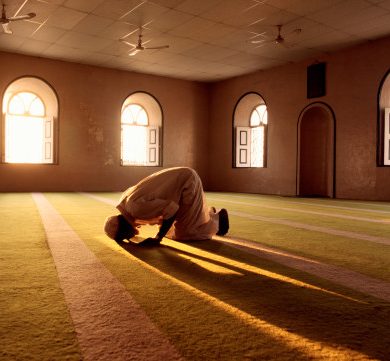God did not create His religious commands for the heavens; rather they were for this earth and man: ‘O you who believe! Answer (the call of) God and His Messenger when he calls you to that which gives you life’ 8:24; He wanted man to build in this life – materialistic, spiritual and cultural building. So, saying that religion has nothing to do with life or law or politics is a joke, or just talk without scientific basis. And we can say that the question of capital punishment for the murderer who has intentionally killed an innocent man is a religious stance, not only Islamic, but one that all religions abide by.
Is retribution life or death?!
The verse ‘And there is life for you in fair retribution, O wise people, that you may guard yourselves (against evil) 2:179 wants us to think: does fair retribution represent a law that life needs and in the interest of human beings? Does it conform to human developments in the issue of dealing with crime after the development of penal law in the world? How come the Holy Qur’an describes retribution as life when it annihilates it? On the basis of this: how can we present the retribution ruling as legislation that is in the interest of man?
Deterrence to protect society
First, let us imagine a society with no punishment whatsoever, in which people do whatever they like and follow their tastes and desire and any other negative human characteristics or complexes – what would that society be like? It would be a society of chaos, in which criminals are free to murder others without any deterrent. The matter extends beyond killing one person to killing society, or a lot of its members, something which we see in those who commit wholesale crimes using what man has recently produced, such as atomic weapons, missiles, explosives and similar means of destruction and annihilation. How would peoples’ lives be in a society such as that? Such a society would fail to secure a safe and secure life for the individual, as he would be living with continuous worry for his life, whether in his home or at work or anywhere, since there is nothing to deter the criminal or deviant person from doing anything that victimises that person. In many in the world, we know that some people do not leave home at night or walk any distance for fear of criminals or gangs that kill people and steal their possessions, because there is no deterrent, either because of the location of the place or the abnormal circumstances that the country finds itself in. This is why we say that capital punishment serves as a deterrent to prevent murder from becoming normal in society, and to reduce the motive in whoever is intending to commit murder, it is thus preserving his life as well. That said, capital punishment will not end this crime completely, but it will reduce it a great deal.
When we look at the case of the United States, which some people – rightly or wrongly – regard as being at the top of the advanced, civilised and developed countries, in those states that abolished capital punishment and replaced it with life imprisonment, we find that there are some streets that security officers cannot enter at night as criminals have taken charge; this is why crime increases, making the United States suffer from more crimes – according to statistics – than what is called the Third World. This is because execution of murderers represents a law of deterrence, even if it may be implemented wrongly, while other countries have no sufficient deterrent, even if murderers are sent to life imprisonment. This is what appears when looking into the matter on the ground, or in reality.
Question marks over capital punishment
Three question marks can be raised over capital punishment, two of which are general while the third relates to the Islamic Shari’ah and its dimensions in particular.
The first question mark
The legislation of execution of convicted murderers represents treating one crime with a similar punishment, on the basis that the killer’s behaviour resulted in taking the life of the victim; so if the gravity of the crime relates to the gravity of ending life, then this applies to the execution of the killer as well. In other words, if life is sacred, it must be preserved wherever it exists, so what is the difference between the sacredness of this life and that life? This argument is still represented by many people in the world.
Discussion
Islam, in it’s treatment of man’s issues, proceeds from a realistic viewpoint that aims at protecting the individual in addition to protecting others, so that anything that harms his body and mind is prohibited, i.e. God does not give man freedom to harm his life, and He wants him to seek protection from any others who want to harm him; this is on the individualistic side of things.
But God also wants to protect society…Islam wants to strike a balance between the safety of the individual and that of society – but neither for society to persecute the individual through its establishments, nor for the individual to harm society. In light of this, Islam’s respect of the individual is in the fields where society’s safety is not threatened, since the safety of society is more important than that of the individual. When the murderer committed his crime, he did so against an innocent person…and he committed a crime against humanity since the victim did no crime for which he deserved killing. When the killer is executed, i.e. annihilated, he is being annihilated on that basis that he has annihilated the life of another human being with whom there existed no legitimacy for annihilating him – the Qur’an says: ‘whoever slays a soul, unless it be by manslaughter or on account of mischief in the land, it is although he slew all mankind’ 5:32.
We have to think about the matter from the standpoint of principle, that God, the Almighty wants us to take a decisive position towards injustice, and there is no doubt that the person who kills another intentionally and without any justification, as opposed to cases of self-defence or in defence of the homeland or the like, has inflicted injustice against the victim.
The second question mark
When we study the personality of the criminal and his motives, we see that these motives do not necessarily stem from his particular nature, but may stem from the influence of external factors; he is a person whose surrounding circumstances and environmental context can be seen to impose a mentality of crime on him. So, crime comes from a complex of circumstances that imposes itself on him, exactly like any psychological illness that takes place as a result of some negative factors in the family or the environment, or some shocks in life leading to unsettling of his personality. Those upholding this opinion conclude that we have to treat the murderous criminal with psychological therapies, and admit him into mental institutes and hospitals to look into the factors which have been affecting his behaviour. This viewpoint, as a whole, looks upon the criminal as a psychologically deranged or diseased person, like any one suffering from psychological illness, or physical illness for that matter, in both the need to study the causes of the illness and the way treatment with suitable methods should follow.
Discussion
If we followed this notion that every criminal is a psychologically ill person, we would have to close all prisons, or abolish the penal law and fill the world with mental hospitals! A murderer is to be executed if he chose to kill and did so intentionally, meaning that he did have a choice to go ahead with the crime or not. Islam says that if the criminal is suffering from psychological illness that prevents him from choosing in a matter, and that he did what he did through a lack of awareness or a lack of mental capacity, in this case he is not responsible. However, if he is not like that, but has proceeded with his crime through his own decision, in this case, he is regarded as a criminal because he has had the choice not to go ahead with his crime. Some may say that the alternative to capital punishment is life imprisonment, however, if we want to compare between the execution of a convicted murderer and putting him in prison for the rest of his life, which can be 30,40 or 50 years or until he dies, the difference is not that big, and the latter can be much worse! This is because the murderer who is imprisoned for life dies twenty times each day…life imprisonment makes the prisoner feel he is living an everlasting spiritual and emotional death.
The third question mark
This relates to the human aspect in Islam, or in all religions that are based on a merciful stance. The Qur’an emphasises mercy in many verses such as ‘And We have not sent you (O’ Muhammad) but as a mercy to all creatures’ 21:07. Islam, in its depth and in all its aspects of values and legislation, proceeds from a stance of mercy and the Message is the door that opens mercy in all its colours. Therefore – according to some – this mercy does not conform to the adoption of capital punishment for murderers; rather it is more appropriate to open the door of repentance and pardon.
Discussion
If criminals and murderers and other violators of human rights are left free to do what they like, and people, in contrast, are not given the chance, in legislation, to stop or punish them, life will become an arena for criminals, and this can never produce a balanced system in the interest of mankind. Therefore, when we look into the issue of mercy, we must not do so on the basis of the individual importance or this or that criminal, rather we have to compare between preserving the life of the murderer and the life of the nation or society, and public order, so as to establish which is more important. Naturally, reason emphasises that society is more important in this regard. Let us give an example in the question of mercy. It is natural that when a person’s leg or arm or one of his organs is severed to regard this as cruel misfortune. However, if there is a certain disease in that leg, arm or organ, so that if it is not severed the person will die, in this case we find that severing that organ is not considered cruel, but a mercy, and cruelty is to keep it in its place. So it cannot be said that it is merciful to keep that organ, since when there is a competition of interests between an organ of the body and the whole body, reason rules that your mercy towards that person is to sever that diseased organ.
So, the question of mercy is relative – when the matter relates to the general right of the whole, i.e. the society or the nation, this takes precedent over mercy towards the part, the private or the individual. The notion that says fair retribution contradicts mercy is supported by those who do not understand the meaning of mercy in Islam – it is not kindness, rather it is interest. Therefore, the whole of the Islamic Shari’ah, including punishments, hardships and trouble, has been mercy for all creatures. On the basis of this, we find the legislation of retribution a legislation in the interest of all humanity, and it is what preserves the life of society from the aggression of the individual; and that mercy has been made available by God to those who have mercy on people, but those who do not have mercy on people, including mischief-doers, criminals and murderers, do not deserve mercy, except under certain conditions that conform to the interest of society in certain circumstances.
The above has been directly taken from the book: Contemplations on Reason in Islam by Sayyed Mohammad Hussain Fadhlullah.
Please note: Some parts of the discussion on capital punishment in the book have been omitted or rearranged, in order to keep it short and easier to read as a blog post. To read the entire, extensive discussion, we recommend you read the chapter on capital punishment from the original book (pages 327-360). Click here to download the book as a PDF file.
All rights are reserved to Dar AlMalak publishers, and intellectual property belongs to his eminence Sayyed Muhammad Hussain Fadhlullah






